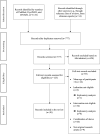Virtual Delivery of Parent Coaching Interventions in Early Childhood Mental Health: A Scoping Review
- PMID: 37740798
- PMCID: PMC12095452
- DOI: 10.1007/s10578-023-01597-8
Virtual Delivery of Parent Coaching Interventions in Early Childhood Mental Health: A Scoping Review
Erratum in
-
Correction: Virtual Delivery of Parent Coaching Interventions in Early Childhood Mental Health: A Scoping Review.Child Psychiatry Hum Dev. 2025 Jun;56(3):893. doi: 10.1007/s10578-023-01632-8. Child Psychiatry Hum Dev. 2025. PMID: 37940709 Free PMC article. No abstract available.
Abstract
Parent-coaching interventions positively impact child development. Virtual delivery of such interventions is supported by literature reviews and a practice guideline, however, none of these focused on children under age six. A scoping review of virtually-delivered parent-coaching interventions for disruptive behaviour, anxiety, and parent-child relationship concerns in children under age six was conducted between Dec. 15, 2020 and April 22, 2021. Iterative searches of the databases PubMed, CINAHL, and PsycINFO were complemented by reference list searches and clinician expert review (N = 1146). After relevance screening and duplicate removal, collaboratively-developed inclusion criteria were applied to records, followed by data extraction from eligible articles (n = 30). Most literature documented behavioural-based interventions targeting disruptive behaviour which were delivered individually, by therapists, to White, non-Hispanic parents. Evidence supports feasibility and efficacy of virtually-delivered parent-coaching interventions to improve child disruptive behaviour (strong), anxiety (moderate), and parent-child relationship (weak). There is a significant gap in the literature regarding the virtual delivery of attachment-based parent-coaching interventions. In sum, virtual parent coaching can be an efficacious approach for children under age six, particularly for behavioural challenges.
Keywords: Behavioural interventions; Early childhood mental health; Parent coaching; Scoping review; Virtual.
© 2023. The Author(s).
Conflict of interest statement
Declarations. Conflict of interest: No authors have any relevant conflicts of interest to declare. Research Involving Human Participants and Animals: Not applicable. Ethical Approval: Not required. Consent to Participate: Not applicable. Consent for Publication: Not applicable.
References
-
- Troutman B (2015) Integrating behaviorism and attachment theory in parent coaching. Springer International Publishing, New York
-
- Egger HL, Angold A (2006) Common emotional and behavioral disorders in preschool children: presentation, nosology, and epidemiology. J Child Psychol Psychiatry 47(3–4):313–337. 10.1111/J.1469-7610.2006.01618.X - PubMed
-
- Raver, C. C., & Knitzer, J. (2002). Ready to Enter: What Research Tells Policymakers About Strategies to Promote Social and Emotional School Readiness Among Three- and Four-Year-Old Children. 10.7916/D82V2QVX
-
- Ramey CT, Ramey SL (1998) Early intervention and early experience. Am Psychol 53(2):109–120. 10.1037//0003-066X.53.2.109 - PubMed
-
- Zeanah PD, Bailey LO, Berry S (2009) Infant mental health and the ‘real world’—opportunities for interface and impact. Child Adolesc Psychiatr Clin N Am 18(3):773–787. 10.1016/J.CHC.2009.03.006 - PubMed
Publication types
MeSH terms
LinkOut - more resources
Full Text Sources
Medical
Research Materials
Miscellaneous


